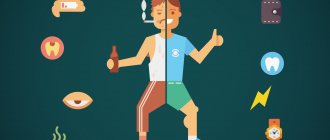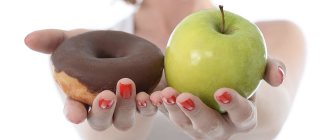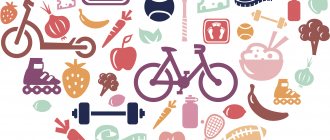Everyone has bad habits. We know about some and try to fight them, but we don’t even know about others. Some practically do not interfere with us, while others can seriously complicate life. And fighting them is often not so easy. Together with psychologist Nadezhda Pozharova
We find out how to properly get rid of bad habits once and for all, and analyze the most common mistakes.
12 bad habits that make us look bad
Content
- What bad habits does a person have?
- How bad habits appear
- Bad habits and their impact on human health
- Prevention of bad habits
- How to deal with bad habits?
- How to give up bad habits
- How to get rid of bad habits
A person's whole life is a set of habits. And the more useful habits a person has, the more effective and beautiful his life is. The more harmful ones, the harder and more meaningless life is.
Useful habits help a person realize his or her potential. Harmful ones take away time, health, prospects, strength and life!!!
At first, a bad habit seems harmless and even pleasant. But over time, the picture changes dramatically.
We will examine this question in this article in as much detail as possible. And if you want to get rid of bad habits, read the article to the end.
Introduce changes gradually
Don't try to change completely in one day: it's impossible. Be patient. Focus on one habit and think about the incremental small steps you will take.
For example, you want to reduce the amount of junk food in your diet. If you try to completely change your diet at once, you won’t succeed. Instead, start putting less sugar in your food or swap the creamer in your coffee for skim milk. When it starts to come easy to you, add new small steps. Gradually they will lead to big changes.
What bad habits does a person have?
I believe that the very definition of a bad habit does not entirely reflect reality. The problem with bad habits is that a person ends up becoming addicted to something! And it is difficult for a person to cope with this addiction on his own.
Many habits - addictions - arise from the first experience and without any repetition.
Here is the main set of addictions (bad habits) that are most common today.
-Alcohol addiction -Gaming addiction -Tobacco addiction -Food addiction -Internet addiction to a person -Addiction to emotions -Porn addiction -Drug addiction -Shopaholic -Promiscuous sexual intercourse -Perfectionism
In classical psychology, dependence is called abdication.
Abdication is an uncontrolled and difficult to manage human craving for something material or non-material, including a painful craving for a person or certain actions and experiences.
This craving often arises without clearly expressed reasons and disappears for a while, when the desired is achieved.
Alcohol
Addiction to alcohol also does not leave its mark on the body. Every day there are more and more alcoholics. Previously, the majority were adult men. But today the situation has changed radically: women and even teenagers are increasingly becoming dependent on alcohol.
First of all, it should be noted the detrimental effect on the brain; with constant consumption of alcohol, it begins to gradually deteriorate - healthy brain cells die off.
Alcoholism is also fraught with consequences for the body such as:
- Serious liver problems that can even lead to death;
- Problems with the gastrointestinal tract, increased risk of developing peptic ulcers;
- Problems with memory and attention;
- Impaired coordination of movements and balance even when not intoxicated;
- Kidney diseases;
- Increased risk of developing cancer;
- Psychological instability.
You can often hear that drinking alcohol is a way to cheer up. But this is a trap: the slight euphoria from alcohol the next day turns into a sharply depressed mood with a feeling of hopelessness and melancholy. And the more often a person drinks, the more pronounced this condition becomes. Therefore, alcohol is more likely a cause of low mood, rather than a cure for it.
How bad habits appear
At the root of any addiction is a psychological reason. The complexity of addiction is that it is supported by purely physiological processes occurring in the brain area. Dependence is often not realized by a person and has a logical basis:
“I drink because I’m tired! And I can stop drinking at any time.” “I play to distract myself and relax. And I can choose not to do this at any time.”
It seems to a person that he can give up the habit at any time and it helps him in some way. Relax, get distracted, rest, find a solution.
In fact, if a person tries to give up the habit, after a while he begins to “break” and shake, like a drug addict.
Many habits are formed during adolescence. And only part of it is mature. And this must be taken into account in the process of raising a child!
At the initial stage, a bad habit has a standard set of psychological reasons.
-Imitation of elders, strong, authoritative -Demonstration of maturity or courage -Entertainment -Relieving tension -Relaxation -Desire to experience new sensations and impressions -Take a break from problems -Relieve some psychological complexes
For example, teenagers start smoking so that everyone can see that they are adults, brave and different from the “nerds”.
Those. Smoking at the initial stage is a desire to assert oneself among the “strong” and stand out among the “weak”.
At first, smoking does not give the child any pleasant sensations, much less pleasure. But psychologically, when inhaling tobacco smoke, a child feels more confident among his peers and within his community.
Please note that it is not the cigarette! The fact is that the child is trying to assert himself! And if he wants to assert himself, then he does not feel complete! And this is a matter of education!
Under the same pretext, a teenager first tries alcohol, and sometimes drugs, among his “like-minded people.”
Alcohol is often given to a child by parents to confirm his maturity and remove an invisible psychological barrier. “You’re an adult now, son.” A ridiculous “initiation” into adulthood! Do you agree?
Drinking alcohol itself is stupid, not only for a child, but also for an adult!!! Look at how drunk people look and behave! This is the behavior of far from sane people!
How many stupid things and mistakes are made under the influence of alcohol?
By giving your child alcohol, are you wishing him stupidity and mistakes in life?
The first intake of alcohol, just like a cigarette, does not bring physical pleasure to the child. But the recognition of his “maturity” causes psychological satisfaction.
They treat him differently!!! A certain unity and “mutual understanding” appears. And the psychological satisfaction that he experiences at this moment is a purely chemical process associated with a neurotransmitter called dopamine.
After a feeling of “maturity,” under the influence of dopamine, the brain remembers this pattern.
Cigarette, alcohol = recognition, respect, mutual understanding!
Accordingly, everything further is very simple. If you want to experience these sensations again, smoke, or better yet, drink!!!
A person does not understand that he is engaged in self-deception and any addiction-habit is not a solution to the problem!!!
Note that the root of a bad habit is not the desire to smoke or drink! At the root is the desire to assert oneself and feel complete.
You say, “what about other addictions”?
I will answer. Exactly the same!
All bad habits are of the same nature! And shopaholism, and perfectionism, and gambling addiction and dependence on a loved one and everything else!!!
A woman, buying things in boutiques, feels more complete and satisfied!
A man who sets records in bed with different women feels more confident with each successive one.
A gambler entering the game once again hopes to see him leave the table to applause and see the admiring glances of his loved ones!
A person who depends on someone feels complete next to him if he sees the necessary attitude towards him.
Please note that in all cases of bad habits there is a desire to assert oneself and become recognized and valuable! It’s just that in some cases it is expressed explicitly, in others it is hidden.
It is on this basis that they are formed and constantly reinforced by the actions of an addiction.
A person is ready to do anything to be recognized, respected and appreciated. Those. Low self-esteem is at the root of this problem.
Later, the second motive for a bad habit appears - to distract from problems and take a break from everything, switching to a harmful action!
How does withdrawal syndrome manifest?
Withdrawal syndrome is a group of symptoms that occurs when a person abruptly withdraws from substances to which the body is accustomed.
This could be alcohol, nicotine, medications. When it comes to psychoactive substances, withdrawal symptoms are called withdrawal symptoms, or, in common parlance, withdrawal symptoms. Symptoms in this case are divided into two groups: physiological and psychological; according to the degree and intensity of their manifestation, we can talk about a possible risk to human health.
Mild withdrawal syndrome
- insomnia
- anxiety
- irritability
- nausea, moderate abdominal pain
Moderate withdrawal syndrome
- tachycardia
- sweating
- tremor
- high blood pressure
- severe nausea
- vomit
- diarrhea
Severe withdrawal symptoms
- all of the above
- fever
- hallucinations
The intensity of symptoms and their duration depend on the overall clinical picture, the psychological characteristics of the person and the “severity” of the substances that he refuses. So, when giving up nicotine or coffee, a person can only experience irritability and headaches, and giving up alcohol can be either mild or severe with hallucinations - the infamous “squirrel”.
Bad habits and their impact on human health
Now let's look at the impact of habits on health.
I think that you yourself know about the dangers of tobacco, alcohol, drugs and overeating. And are familiar with their possible consequences
But few people know about the dangers of other habits.
Vision problems for those who live in gadgets and computers do not particularly bother them. Habit is stronger than the fear of losing vision. Because the feeling of anticipation under the influence of dopamine suppresses the feeling of fear and rationality.
All addictions negatively affect the nervous system and shake the psyche! And this has a negative impact on health.
People suffering from any kind of bad habits eventually become mentally unstable. And the longer they are under the influence of addiction, the more their nervous system sways! They become hot-tempered, impulsive, aggressive and unrestrained. Especially in those moments when something happening hurts their self-esteem.
And if something doesn’t work out for such a person, or they don’t “believe” in him, he has a craving for action, which is associated with his addiction. Because this action gives him a feeling of completeness or an altered state of consciousness.
Poor nutrition
An unbalanced diet and lack of eating habits are a serious problem that can destroy your health in a short time.
The most common errors in nutrition and diet are:
- Eating food before bed. This significantly complicates the work of the gastrointestinal tract and leads to interruptions in the functioning of the digestive system.
- Excessive consumption of sweets. Sweets are fast carbohydrates that sharply increase blood sugar levels. After a sharp jump, an equally sharp decline occurs. Frequent surges can cause disruption in the body's endocrine system. In addition, people with a sweet tooth often overeat, because... A drop in sugar levels causes an acute feeling of hunger. In addition, excess sugar consumption causes oral diseases and disrupts digestion.
- A large amount of salt in the diet. Excess salt has a detrimental effect on the kidneys and urinary system as a whole. It can also cause musculoskeletal problems.
Eating disorders such as anorexia and bulimia deserve special attention. Anorexia is a refusal to eat or a significant restriction of food, and bulimia is an uncontrolled overeating, after which a person feels shame and vomits. Eating disorders lead to vitamin deficiency, anemia, exhaustion, and disturbances in the functioning of the cardiovascular system. These are life-threatening conditions that require mandatory consultation with a nutritionist and psychiatrist.
Prevention of bad habits
For prevention, it is important: First, admit to yourself that habit is guiding you. The second is to see at what moments it appears. Third, understand what motive guides you at the moment when the desire to perform a habitual action appears. Fourth, start consciously giving up the habit.
The task of prevention is to realize, see and analyze the problem into details.
Learn from mistakes
We are all not without sin. If you mess up, just accept what happened and think about what you could have done differently. Write down your ideas in a plan of salvation that will become more perfect over and over again. Each mistake will become a stepping stone to breaking the habit.
I am not saying that the method I have proposed is simple, but many of those who ignored these ideas ended up sticking to their biases. You definitely don't need this. Immerse yourself completely in the process, find a strong enough motivation and replace the bad habit with a good one, with which you will respond to every irritant. You can do it, I promise.
How to deal with bad habits?
Breaking bad habits is very difficult. Those people who try to resist them fall into the territory of psychological stress.
This leads to internal tension and resistance. And the more a person fights, the stronger the internal protest against violence against oneself becomes.
Many hold on with their last strength so as not to succumb to the motive that forces them to return to their usual course. And they often break down. And this can last forever!
In the case of habits and addictions, you need to move carefully.
To begin with, you can make it a habit to reward you for doing something useful. “I’ll do this useful task and allow myself to become a habit.” Later, you reward yourself with a habit for two useful actions. Then you move the habit to the end of an effective day.
Then you move the habit as a reward for an effective week at the end of the week.
And over time, you will realize that you can give it up completely!
Train yourself to think differently about your habits
Even if we hate some habit and scold ourselves for smoking or biting our nails, we still continue to do it. This is how we get a feeling of satisfaction, a certain psychological reward.
Watch your thoughts. Remind yourself of the negative aspects of a habit every time you think about its benefits. For example, when you thought: “I’m so sad, now I’ll eat a cake and I’ll feel better,” immediately tell yourself: “Now I’ll eat a cake and gain excess weight, and even increase the risk of diabetes.”
Reframe your thoughts to remind yourself of the negative aspects of the habit. Do this every time you notice that you are thinking about its advantages.
How to give up bad habits
The word abandon in relation to addictions is appropriate at the initial stage.
It is precisely to refuse, and not to confront the problem. It is much easier to refuse than to fight.
If you have realized what triggers the habit, then you know at what moments, under what circumstances and under what conditions it turns on. And at the moment the “trigger” is pulled, you see it. At this point, you first consciously give up the habit.
It is important to understand and experience in advance what you will feel when you give up the habit. What feelings, what mood, what attitude towards yourself will appear with refusal?
This must be realized and felt in advance, so that at the moment of attack from the habit there is something for which you give it up! From this moment, a conscious refusal of the habit begins, during which dopamine is produced from the refusal.
Beware of irritants
What situations triggered bad habits? A habit is not formed by itself, it is always reinforced by something from the outside: you smoke when everyone around you smokes, go shopping when you are nervous, eat all sorts of rubbish when you are bored, turn on porn when you are lonely, and hang out on social networks when need to kill time. Observe yourself for a few days and determine what your triggers are. Include them in your rescue plan and try to avoid provoking situations.
Nanohabits. Small steps that will lead to big changes
B.J. Fogg
Eksmo Publishing House, 2020
My master plan consists of three phases for eliminating unwanted habits.
First, new healthy habits are created. Then we focus on stopping a specific action associated with the old habit. If this doesn't work, the third phase begins - replacing the old habit with a new one.
Each phase is divided into steps, which I've diagrammed in the appendices (they're too detailed to include here, but you can check them out below).
Traditional methods of behavior change (at least those that work) are also part of my Master Plan. Think about motivational interviewing, a counseling technique that helps clients discover their motivations. This is the traditional approach that I think is worthwhile. After such an interview, a person better understands why he wants or does not want to perform a specific action.
Having a partner also plays a big role. Responsibility to him has a direct bearing on motivation. And your partner can influence your abilities, suggest how to complicate the performance of unwanted actions and even make them impossible. If you're trying to use less technology, your partner might suggest setting a timer that turns off the Wi-Fi at 8 p.m. Surfing the Internet late into the night will become much more difficult (thank you, responsible partner).
The master plan shows the complex work of proven techniques and how they help unravel the knots of unwanted habits. In addition, the plan specifies the sequence of steps. This is not just a list of techniques or a set of instructions. This is a whole algorithm for creating change by untangling the knots of habits that cause you pain.
You are ready?











